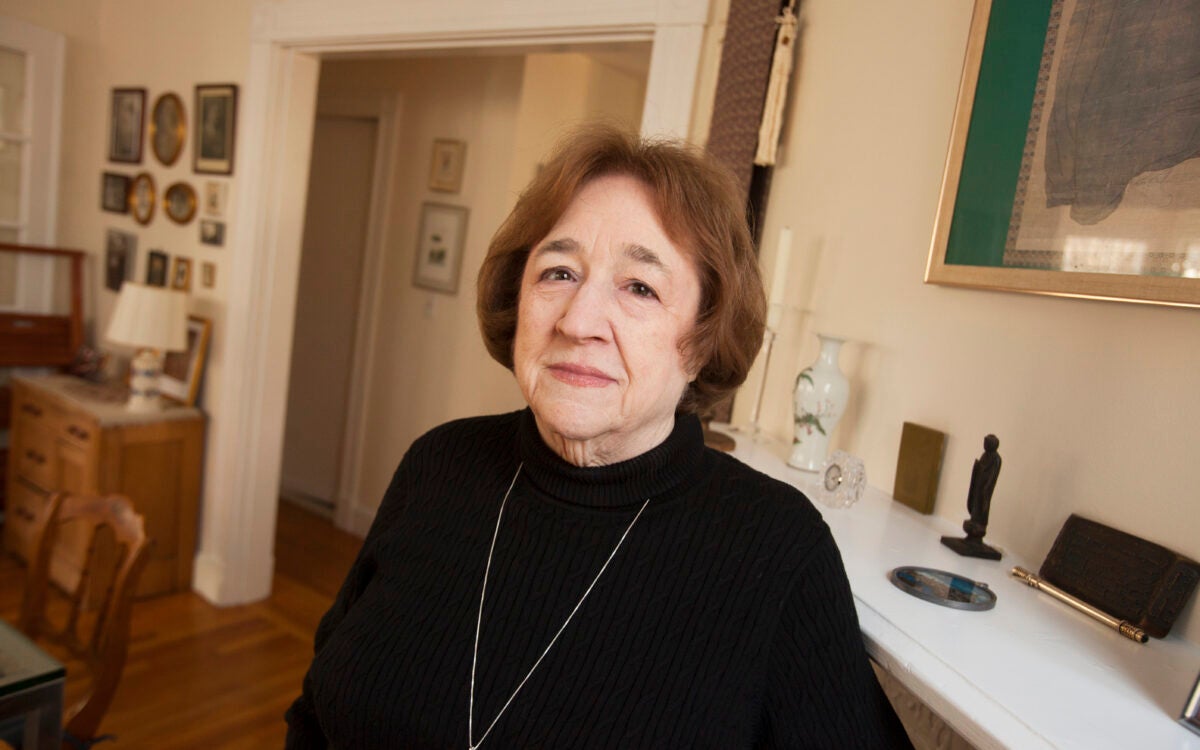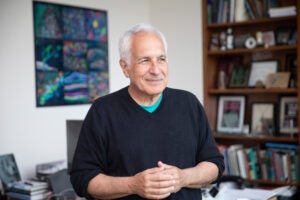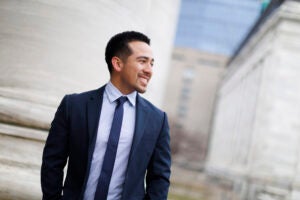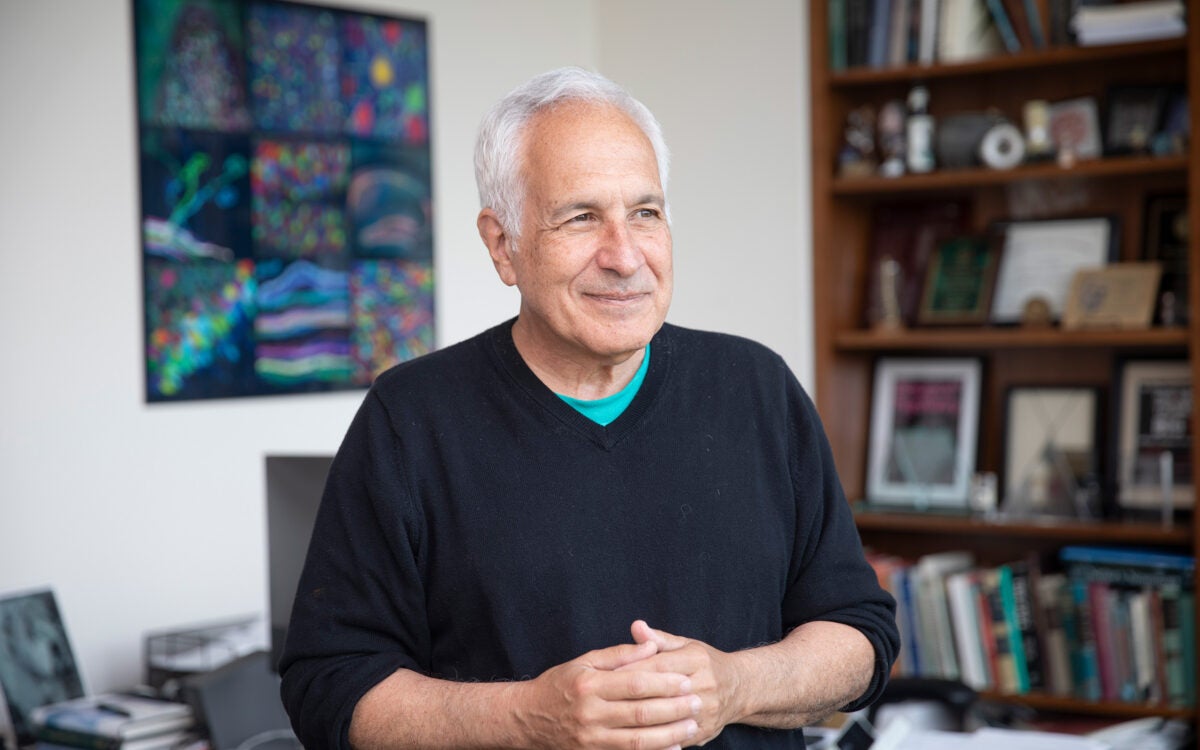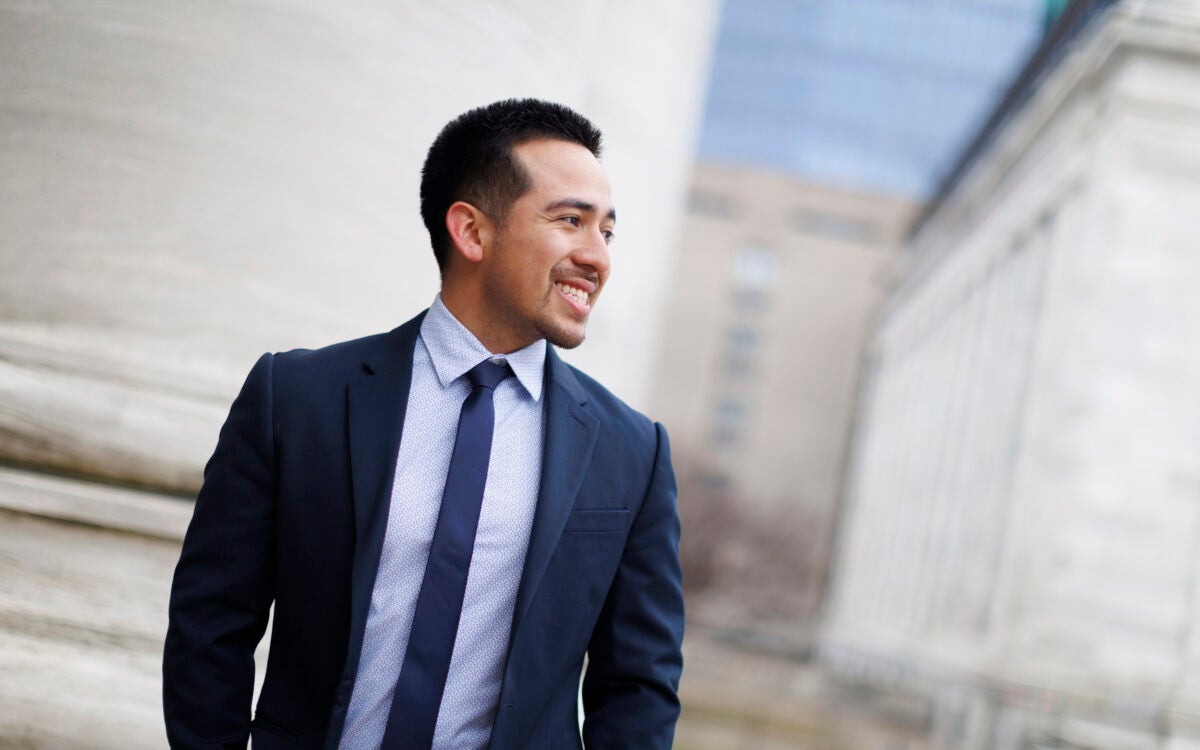MacArthur Foundation honors three Harvard faculty members, Radcliffe fellow
Probers of cells, surgery, the universe, and modern ruins supported with ‘genius’ grant
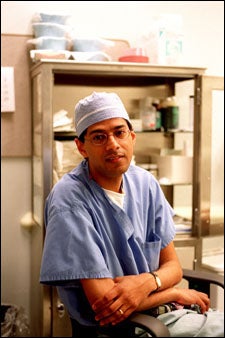
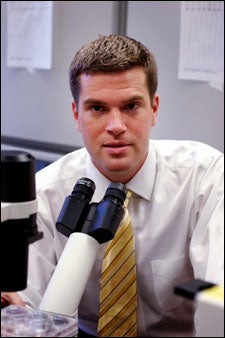
Harvard faculty members and a Radcliffe fellow probing the mysteries of stem cells, the early universe, the modern practice of surgery, and the significance of public sights and modern ruins were honored Tuesday (Sept. 19) with the John D. and Catherine T. MacArthur Foundation’s $500,000, no-strings-attached “genius grants.”
The four are Assistant Professor of Molecular and Cellular Biology Kevin Eggan, Assistant Professor of Health Policy and Management and Assistant Professor of Surgery Atul Gawande, Professor of Astronomy and of Physics Matias Zaldarriaga, and Radcliffe fellow Anna Schuleit.
The four join 21 other MacArthur Foundation fellows engaged in a broad spectrum of endeavors – from deep sea exploring to journalism to sculpting – who have in common creativity and originality.
“It is indeed good news that the MacArthur Foundation has recognized what colleagues at Harvard already knew: that these three young faculty members have shown extraordinary talent and promise,” said Harvard interim President Derek Bok. “We congratulate them on their well-deserved fellowships and look forward to the knowledge and understanding that will doubtless result from their work in the years ahead.”
Probers of cells, surgery, the universe, and modern ruins supported with ‘genius’ grant
By Alvin Powell
and William J. CromieHarvard News Office
Harvard faculty members and a Radcliffe fellow probing the mysteries of stem cells, the early universe, the modern practice of surgery, and the significance of public sights and modern ruins were honored Tuesday (Sept. 19) with the John D. and Catherine T. MacArthur Foundation’s $500,000, no-strings-attached “genius grants.”
The four are Assistant Professor of Molecular and Cellular Biology Kevin Eggan, Assistant Professor of Health Policy and Management and Assistant Professor of Surgery Atul Gawande, Professor of Astronomy and of Physics Matias Zaldarriaga, and Radcliffe fellow Anna Schuleit.
The four join 21 other MacArthur Foundation fellows engaged in a broad spectrum of endeavors – from deep sea exploring to journalism to sculpting – who have in common creativity and originality.
“It is indeed good news that the MacArthur Foundation has recognized what colleagues at Harvard already knew: that these three young faculty members have shown extraordinary talent and promise,” said Harvard interim President Derek Bok. “We congratulate them on their well-deserved fellowships and look forward to the knowledge and understanding that will doubtless result from their work in the years ahead.”
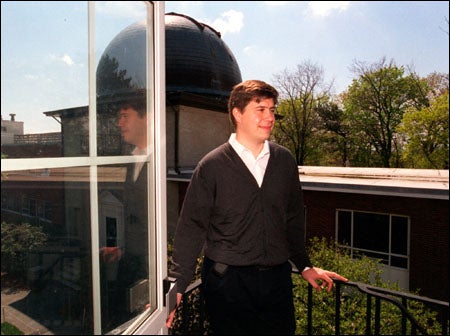
The fellowships entrust a $500,000 grant to each of the recipients, with no reporting requirements or other stipulations. Their intent is to let those selected accelerate their current activities or take their work in new directions, recognizing the “spirit of freedom intrinsic to creative endeavors.”
“The annual announcement of the MacArthur Fellows is a special opportunity to celebrate the creative individual in our midst,” said MacArthur Foundation President Jonathan Fanton. “For 26 years, the MacArthur Fellows Program has recognized and supported individuals who inspire us. This new group of MacArthur Fellows illustrates our conviction that talented and creative individuals, free to follow their insights and instincts, will reveal new discoveries and make a difference in shaping our future.”
Reprogramming cells
Eggan, an assistant professor of molecular and cellular biology in the Faculty of Arts and Sciences and principal investigator of the Harvard Stem Cell Institute, is at the forefront of stem cell biology. His research examines how somatic cell nuclear transfer (SCNT), or cloning, can reverse the process of cell differentiation by which stem cells become specific tissue cells.
He has shown that even highly specialized cells, such as olfactory neurons that express only a single odorant receptor, retain full development potential.
Eggan received permission in June 2006 to begin creating embryonic stem cell lines derived from the skin cells of patients with several diseases. His work, according to the MacArthur Foundation, “is moving us an important step closer to developing therapeutic applications for diseases such as Parkinson’s and insulin-dependent diabetes, as well as providing an experimental platform for investigating genetic and environmental factors that give rise to such diseases.”
Eggan reacted as do many MacArthur fellowship winners, with disbelief. Since the selection process is confidential and those nominated are not revealed, the fellows are notified in a phone call out of the blue.
“I’m in shock. Wow!” Eggan said. “My first thought when I heard them was that it was a prank caller.”
As he was able to digest the news, Eggan said his amazement gave way to a feeling of gratitude and happiness, not just for himself, but for the people in his lab and those toiling to unlock the mysteries of stem cells elsewhere.
“The thing that makes me the happiest is the mainstream message of support for embryonic stem cell research and SCNT [somatic cell nuclear transfer] research,” Eggan said. “The fact that the MacArthur Foundation, an organization whose name you hear every day on NPR [National Public Radio], is willing to support and stand behind this research, that to me is the most wonderful, amazing thing. This is one more reason to believe the tide is turning in support of this important research.”
Said Jeremy R. Knowles, dean of the Faculty of Arts and Sciences, “Kevin Eggan’s work is intellectually daring, technically astonishing, and has the potential to yield enormous therapeutic benefits. We congratulate him on this splendid honor.”
Eggan, who received a bachelor’s degree from the University of Illinois in 1996 and a doctorate from the Massachusetts Institute of Technology in 2003, said he plans to use the funding for work in his lab, particularly for research that the federal government refuses to fund.
Eggan was a postdoctoral fellow at the Whitehead Institute for Biomedical Research from 2002 to 2003 and is a junior fellow in the Harvard Society of Fellows, beginning in 2003. He was named an assistant professor in 2005 and an investigator of the Stowers Medical Institute this year.
Skilled with scalpel and pen
Atul Gawande wields a scalpel and pen with equal skill. The 40-year-old surgeon and author is an assistant professor of surgery at Harvard Medical School and assistant professor of health policy and management at Harvard School of Public Health (HSPH).
He was on his way to operate on a patient when he got the news of his award. “It was out of the blue,” he recalled. “Very exciting. It was a busy day and I had to go on operating without being able to say anything to anyone. At first I thought it was a mistake, because I have been involved in nominating others for the honor. But it’s not a mistake, and I am very excited.”
He writes for both the general public – a column in the New Yorker called “Notes of a Surgeon” – and the medical profession – a column for the New England Journal of Medicine. His 2002 book, “Complications,” provides an insightful and compassionate look at the problems faced by surgeons during their critical training period.
“Atul has great skill in describing the inner workings of the medical profession in a way that is compelling to lay readers,” said Joseph B. Martin, dean of the Harvard Faculty of Medicine. “We at the Medical School are proud that his gift has been recognized by the MacArthur Foundation.”
Gawande said the first thing he will do with the money is to take some time off to work on a book he has been trying to write about the history of experimentation on humans. “It’s a big project, and I have not been able to get it done,” he said. “Now, I will have time for it.”
Gawande not only describes and does surgery well, he improves upon it. Among the many contributions for which he is being honored are bar codes to prevent surgeons from leaving sponges and instruments in patients and a simple one-to-10 score to indicate the likelihood of surgical complications. Working at the Center for Surgery and Public Health at Brigham and Women’s Hospital, a Harvard teaching affiliate, he strives to identify other ways to improve safety and save lives.
Gawande’s leadership and energy were also praised by Barry R. Bloom, HSPH dean. “We feel privileged to have someone with his surgical perspective, his novel research, and literary talent to convey some of the most important public health issues in the country and abroad to a wider audience,” he said.
Born in Brooklyn, N.Y., Gawande received an M.D. in 1995 from Harvard Medical School and an M.P.H. in 1999 from the Harvard School of Public Health.
After the big bang
Matias Zaldarriaga examines a faint whisper of the big bang, called the cosmic microwave background (CMB) radiation, for clues about the creation of the universe and the nature of time after the big bang’s initial, creative explosion.
Zaldarriaga, a theoretical astrophysicist, has already had a large impact on his field, co-writing computer software that is widely used today by astronomers interpreting the CMB radiation.
The MacArthur Foundation said that Zaldarriaga’s analyses reveal the “power of CMB observations such as lensing and polarization to generate gravitational maps of the early universe and for exploring indirectly the properties of otherwise undetectable matter in the intervening space.”
“Matias Zaldarriaga’s work helps us better ‘see’ the early cosmos,” said Knowles. “At the same time, he has enabled the much improved design of the telescopes being built to view the sky. For these twin gifts of sight and insight, he is rightly named a MacArthur Fellow.”
Zaldarriaga was in his office when the phone rang last week with what he termed “a very strange call.” The caller, from the MacArthur Foundation, took some time before telling him the news, asking questions to ensure he had the right person.
Of course, Zaldarriaga said he was both very surprised and very happy at the news. He hasn’t decided what his plans will be for the money, but said it may allow him to travel to conduct research.
“I think there’s quite a bit of responsibility [on the recipient], as it’s a really open-ended award,” Zaldarriaga said. “They are so confident in what you can do, you don’t want to let them down.”
Zaldarriaga came to Harvard in 2003 from New York University as an associate professor of astronomy and physics. He received his doctorate from the Massachusetts Institute of Technology in 1998 and his bachelor’s degree from the University of Buenos Aires in 1994.
Remembering forgotten lives, forgotten places
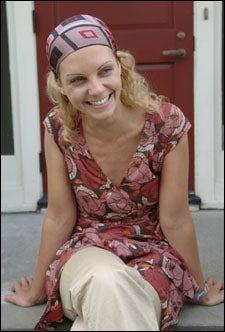
Anna Schuleit, currently a fellow at the Radcliffe Institute for Advanced Study, is a visual artist whose large-scale installations revolve around the archaeology and remembrance of public sites and modern ruins. Her recent works “Habeas Corpus” (2000) and “Bloom” (2003) have explored the social history and architectural decay of state mental hospitals: the first by animating the historic – and crumbling – halls of Massachusetts’ Northampton State Hospital with J.S. Bach’s “Magnificat,” the second by packing the empty spaces of the Massachusetts Mental Health Center’s original building in Boston with lush, blooming flowers. Her work has been praised for its conceptual clarity, compassion, and beauty.
“This award is an artist’s most unimaginable dream,” says Schuleit, “a dream that has come entirely out of the blue. My first thought upon hearing the news over the phone was that the grant committee perhaps mistook me for someone else. My second thought was that if this is true and not a mistake, then I have to run and get back to work right away. I feel so grateful – so grateful – for this honor.”
During her fellowship at the Radcliffe Institute, Schuleit will be working on an installation for an uninhabited island in Boston Harbor for the Institute of Contemporary Art’s Vita Brevis 2007 exhibition. Her research on past military uses of the island; its geography, weather, and tidal changes; and the condition of its crumbling structures will inform this site-specific project, which will function like a temporary land-mark: a gentle marking of the land.
Drew Gilpin Faust, dean of the Radcliffe Institute for Advanced Study and Lincoln Professor of History in the Faculty of Arts and Sciences, said, “We are honored to have Anna Schuleit among us as a Radcliffe fellow this year and congratulate her for this well-deserved recognition of her stunning work.”
Of the next five years, Schuleit says, “I want to continue working in public art, creating projects with/for/about people and their communities. I hope to travel more and to expand my research. Two projects that I never thought I could do because of financial considerations are suddenly back in my daydreams.”
Born in Mainz, Germany, Schuleit earned a B.F.A. from the Rhode Island School of Design and an M.A. from Dartmouth College. She has been a fellow at the Banff Centre, the Blue Mountain Center, Yaddo, and the MacDowell Colony.
– Whitney Espich
Related links:
